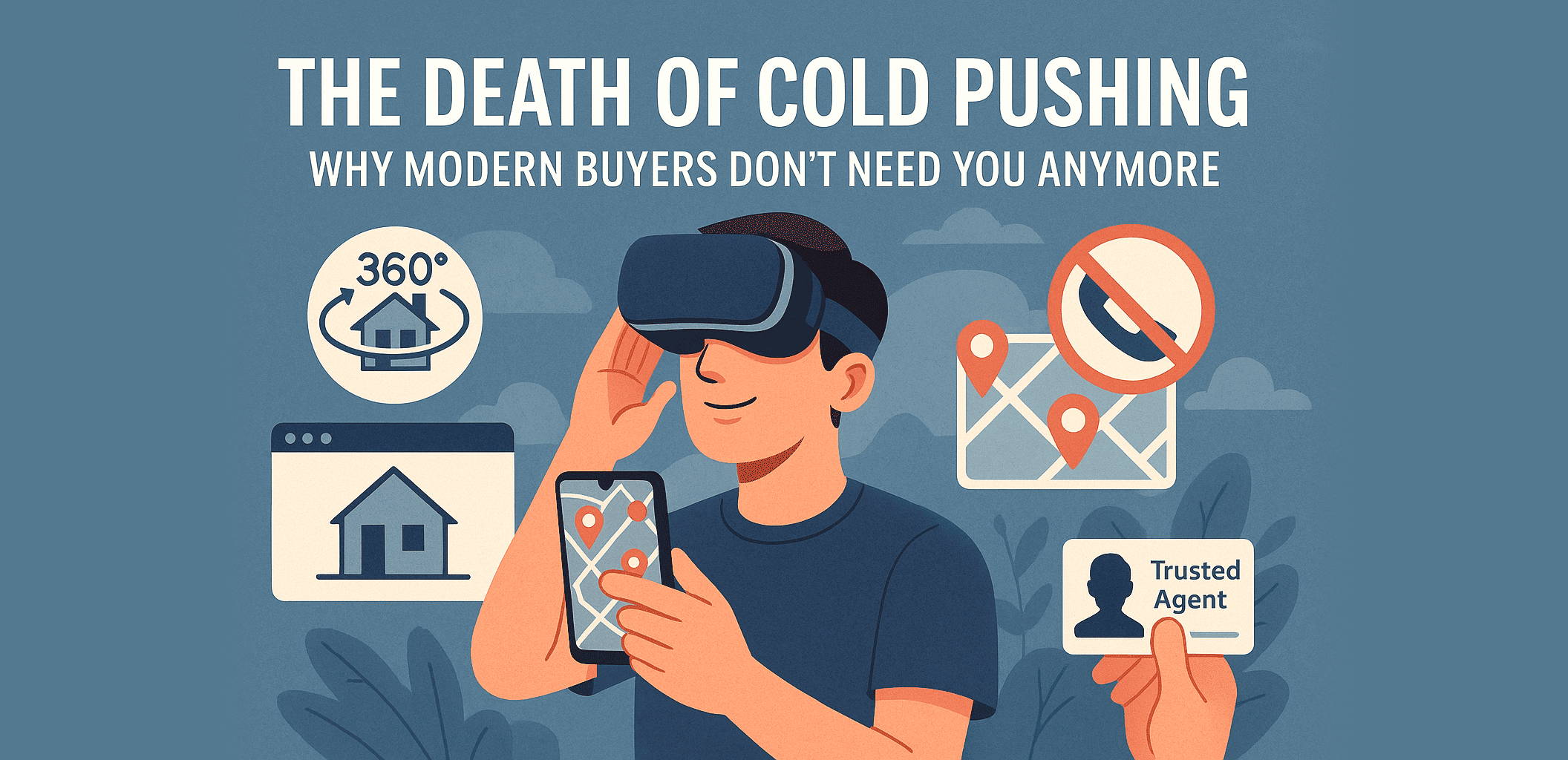The Death of Cold Pushing: Why Modern Buyers Don’t Need You Anymore (Unless You Have IP)

In the past, buyers needed agents for almost everything. They couldn’t see the property without an appointment. They couldn’t visualize the layout without visiting. They couldn’t evaluate the neighbourhood without driving around. The agent was the gatekeeper.
Today, that gate is wide open.
The Fall in Buyer Selection Cost
Thanks to VR tours, 360° views, and Google Maps, buyers can now explore properties, compare layouts, and assess nearby amenities—all from their phones. Their selection cost—the time, effort, and risk involved in shortlisting a property—has collapsed.
They no longer need ten appointments to find the right house. They just need one decision. And that decision is made long before they ever speak to an agent.
A New Generation of Buyers
The majority of today’s active property buyers were born in the 1990s and 2000s. These are digital natives—people who grew up with smartphones, YouTube, Waze, and online shopping. They research everything, compare prices instantly, and expect transparency.
They’re not like the 60s, 70s, or even early 80s generation, who relied heavily on human guidance because technology was unfamiliar. This new wave is tech-savvy, self-reliant, and allergic to hard selling. They trust data, not slogans. They explore entire neighbourhoods on Google Maps before even stepping foot there. They can shortlist a project faster than many agents can reply to a WhatsApp.
This self-reliance has a direct consequence: a low tolerance for unsolicited sales. So when they receive yet another cold message saying “Hi, new property launch, very near MRT!”, their response isn’t curiosity—it’s immediate irritation.
The Prospect Defense System
With too much information flooding their screens, buyers have become defensive. Their phones ring every day with agents pushing “hot new listings.” Their WhatsApp is full of strangers pitching deals they never asked for.
Their reaction is predictable:
Hang up. Block. Report spam.
This is the new normal. The first instinct is no longer curiosity—it’s defense. And if you’re just another agent pushing your listing, you’ve already lost the battle before the first message is read.
Why No-IP Agents Can’t Break Through
In this environment, personal IP (Intellectual Property) is not a luxury—it’s survival.
Without IP, buyers can’t remember who you are.
Without IP, they can’t trust your message.
Without IP, even if they liked your listing, they won’t know who to call back.
A buyer may view hundreds of listings a day, but they only remember the agent who stands for something—the one with expertise, branding, or valuable insights.
When a question arises, they don’t scroll through their chaotic call history. They search for a name they recognize and trust.
What Buyers Actually Want Now
Today’s buyers don’t need another listing-pusher. They can find listings on their own. What they want is a consultant—a buyer agent who helps them:
- Interpret market data
- Avoid common traps
- Compare the real value behind “discounts”
- Understand what suits their long-term goals
In short, they want clarity, not clutter.
Unfortunately, most agents are still playing the old game—pushing supply, not solving problems. That’s why conversion rates keep dropping even as lead costs keep rising.
The Power of IP in Conversion
Let’s look at the numbers.
If you run a Facebook ad and receive 100 leads, and you’re just another faceless agent with no IP, you might convert 3 serious leads—because most don’t trust or remember you.
But if you’ve built a strong personal IP—a recognizable identity backed by authority, testimonials, and a professional digital card (like those inside ListingMine)—your conversion can easily jump to 10 or more serious leads.
That’s 3x the result with the same ad spend. And beyond quantity, quality improves too—buyers with trust in you commit faster, negotiate less, and buy higher-value properties. They’re not “testing water.” They’re choosing you.
The First Impression That Changes Everything
The old impression:
“Not another marketing agent trying to sell me something.”
The new impression, with IP:
“I’ve seen this agent before. Seems professional. Let’s hear what they have to say.”
That’s the power of identity. That’s the difference between being ignored and being invited in.
Key Takeaways
- ✅ The “Selection Cost” has collapsed—buyers complete most of their research before they ever contact an agent.
- ✅ New-generation buyers (90s & 00s) are tech-savvy, independent, and allergic to cold selling.
- ✅ Cold pushing no longer works—it triggers defense, not interest.
- ✅ Personal IP is the new trust currency—without it, you’re invisible.
- ✅ Consultation beats promotion—buyers want advisors, not advertisers.
- ✅ Digital business cards like those in ListingMine help agents anchor their IP and stay memorable.
Final Word
In the age of VR tours and Google Maps, buyers don’t need you to open doors—they need you to open their minds.
If you’re still pushing listings, you’re competing with technology.
If you’re building IP, you’re becoming the trusted advisor that no algorithm can replicate.











































































































